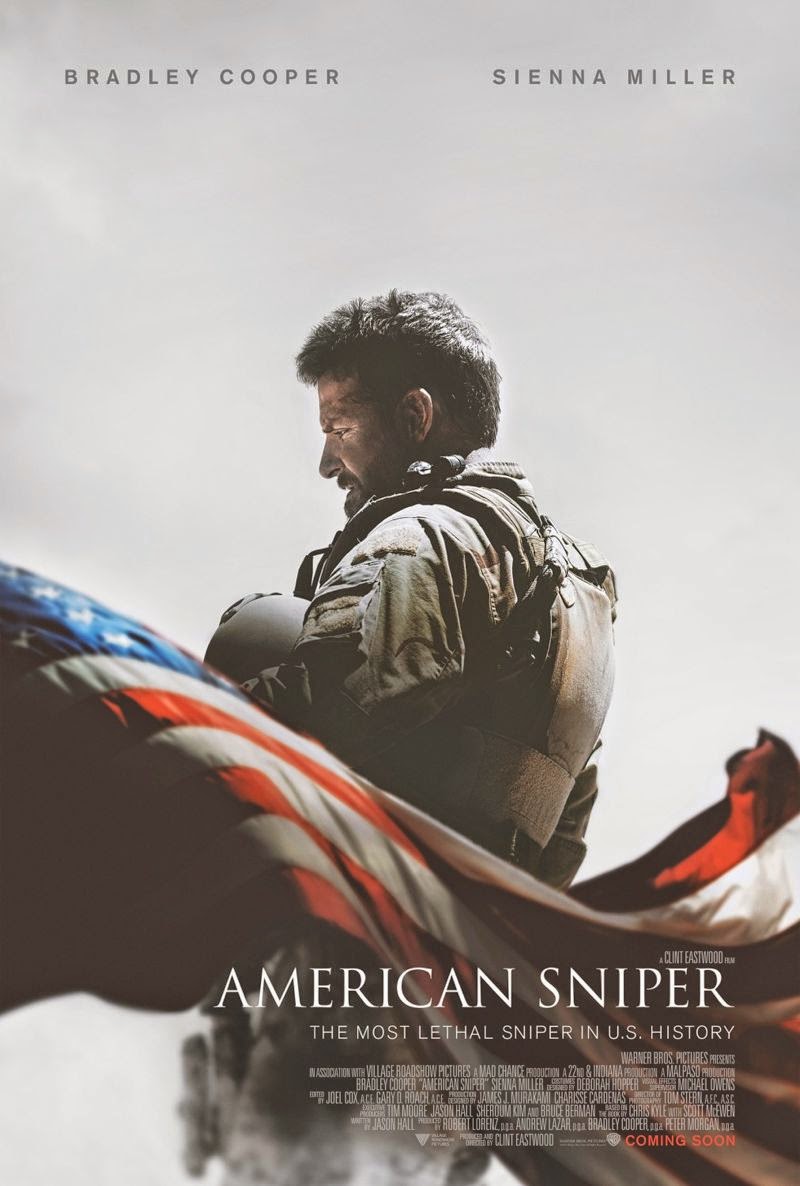American Sniper
http://www.imdb.com/title/tt2179136/
http://www.americansnipermovie.com/
Clint Eastwood’s “American Sniper” is both a devastating war movie and a devastating antiwar movie, a subdued celebration of a warrior’s skill and a sorrowful lament over his alienation and misery. The movie, set during the Iraq War, has the troubled ambivalence about violence that has shown up repeatedly in Eastwood’s work since the famous scene, midway through “Unforgiven,” in which the act of killing anguishes the killer. Eastwood, working with the screenwriter Jason Hall and with Bradley Cooper, who stars in the film, has adapted the 2012 best-selling autobiography by the Navy seal sharpshooter Chris Kyle (which was written with Scott McEwen and Jim DeFelice). “American Sniper” is devoted to Kyle’s life as a son, a husband, a father, and, most of all, a decorated military man—one of the most lethal snipers in U.S. military history. Kyle, who made a hundred and sixty confirmed kills (and more than two hundred probable kills), is always sure that he’s defending American troops—and his country—against “savages.” Perched on a rooftop in Ramadi or in Sadr City, he’s methodical and imperturbable, and he rarely misses, even at great distance. He shoots insurgents, members of Al Qaeda in Iraq, and, when he thinks it necessary, a woman and a child. He’s haunted by the thought of the Americans he hasn’t been able to save. Cooper is all beefed up—by beer as much as by iron, from the looks of it (it’s intentionally not a movie-star body)—and he gives a performance that’s vastly different from any that he’s given in the past. With fellow-seals in the field, he’s convivial, profane, and funny; at home with his loving wife (Sienna Miller, who’s excellent), he’s increasingly withdrawn and dead-eyed, enraptured only by the cinema of war playing in his mind.
Featuring an amazing performance by Bradley Cooper, “American Sniper” is Clint Eastwood’s return as an important filmmaker. Don’t get me wrong, I enjoyed Eastwood’s take on “Jersey Boys” last summer but musicals are not his bread and butter. After years of “one for you” (a “Dirty Harry” flick) and “one for me” (“Honky Tonk Man,” “White Hunter, Black Heart”) with Warner Brothers, Eastwood created “Unforgiven,” winning his first directing Oscar along the way. He followed that film up with “Mystic River” (another Oscar nod) and “Million Dollar Baby” (another Oscar) as well as two very different films that looked at war through different eyes, “Flags of My Father” and “Letters From Iwo Jima.” A musical was probably a nice break but Eastwood is best when he’s looking at life and the moral questions it asks.
Featuring an amazing performance by Bradley Cooper, “American Sniper” is Clint Eastwood’s return as an important filmmaker. Don’t get me wrong, I enjoyed Eastwood’s take on “Jersey Boys” last summer but musicals are not his bread and butter. After years of “one for you” (a “Dirty Harry” flick) and “one for me” (“Honky Tonk Man,” “White Hunter, Black Heart”) with Warner Brothers, Eastwood created “Unforgiven,” winning his first directing Oscar along the way. He followed that film up with “Mystic River” (another Oscar nod) and “Million Dollar Baby” (another Oscar) as well as two very different films that looked at war through different eyes, “Flags of My Father” and “Letters From Iwo Jima.” A musical was probably a nice break but Eastwood is best when he’s looking at life and the moral questions it asks.
The film doesn't present a racist serial killer, nor an arrogant psychopath, and it probably portrays Kyle as more humble than he was, but as a clinical examination of how a great soldier (and in particular a Navy SEAL) is made, what a sniper does, how the door-to-door searches that made up so much of the Iraq War worked, and of the intricacies of what may be thought of as relatively mild PTSD (but strong enough to be dangerous and debilitating), the film is winning on all counts. Like 2014's Fury, it is more of a war film than an anti-war film; Kyle is our protagonist, we're meant to like him, and he takes out Iraqis, and sometimes when he does, we're kind of meant to cheer. Don't forget that Eastwood is a deep Republican, and the film has that sensibility - and yet it's neither insulting nor off-putting, and it's not racist. It's a serious story told with steely conviction, and if its politics are a little right of my comfort level, its obvious cinematic benefits are right in my wheelhouse.
Cooper is fantastic. His performance is totally precise. The gradations he and Eastwood have chosen to show - of Kyle's character, personality and disease - are perfectly graded. We really get a sense of a full man, and if that isn't exactly the man Chris Kyle was, it's certainly an indelible movie character. Sienna Miller provides strong support as his wife Taya; beyond her, there are a bunch of dudes playing soldiers, who all do fine, if predictable, work. Which is probably how it is: amongst a lot of guys who are all a little alike, Chris Kyle obviously stood out.













